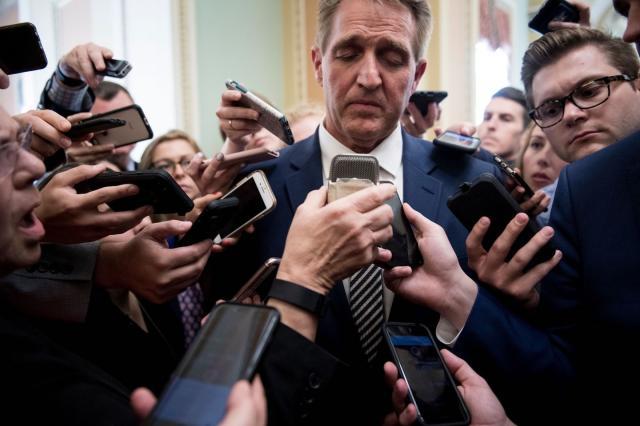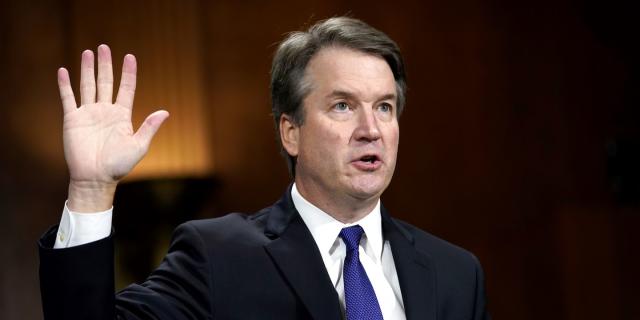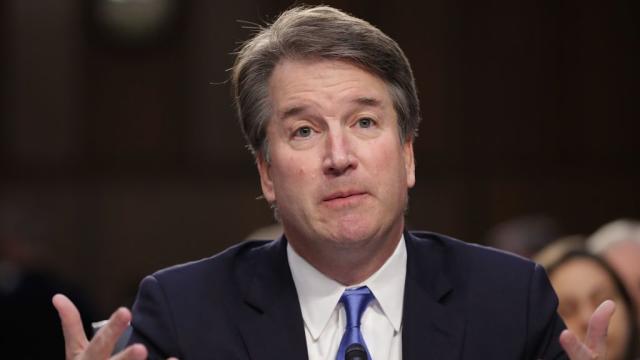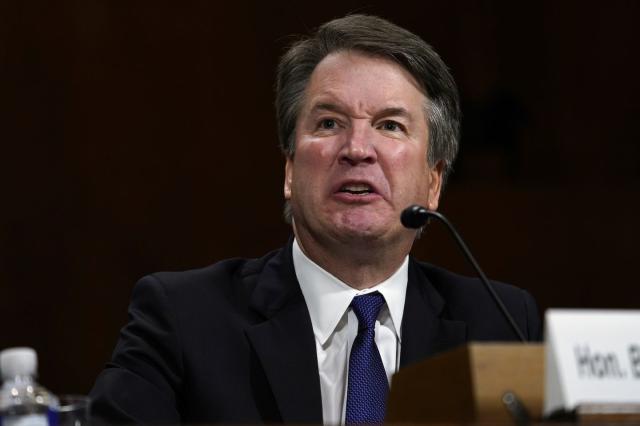Esquire
Jeff Flake Says Brett Kavanaugh’s Nomination Is ‘Over’ If He Lied to the Senate. So What Are We Still Doing Here?
Jeff Flake rounded out a tumultuous 24 hours by voting yes to advance Brett Kavanaugh’s nomination, but with the caveat that Dr. Christine Blasey Ford’s allegations against him must be investigated by the FBI. The scope of the investigation wasn’t exactly clear-except that it could not take longer than a week. The New Yorker already reports there are questions about how the probe is being conducted, as multiple people with relevant knowledge about Kavanaugh’s behavior have been unable to get in touch with anyone at the Bureau to tell their stories. “I thought it was going to be an investigation,” a Yale classmate of Brett Kavanaugh and Deborah Ramirez told the publication. “But instead it seems it’s just an alibi for Republicans to vote for Kavanaugh.”
All that remains to be seen. But we did get a bit more insight into how Flake and his colleague on the Senate Judiciary Committee, Democrat Chris Coons, think it all could play out when they joined 60 Minutes Sunday. Specifically, they weighed in on the prospect that Kavanaugh lied to the committee:
So…what are we still doing then?
Kavanaugh said many things that were not true, both at the hearing Thursday and in previous testimony before the Senate Judiciary Committee. The question, as it often is in this particular era, is whether they were “lies” or merely misleading. Many related directly to Ford’s allegations:
- Kavanaugh repeatedly claimed some version of this statement: “Dr. Ford’s allegation is not merely uncorroborated, it is refuted by the very people she says were there, including by a longtime friend of hers.” He added an extra “refuted” for emphasis. Except, as a piece in Current Affairs points out, this is a lie: Ford’s friend, Leland Ingham Keyser, said she didn’t remember being at the party and didn’t know Kavanaugh. But she didn’t “refute” the story. In fact, Keyser said she believes Ford. Two other named witnesses-Mark Judge and someone named “P.J.”-also did not “refute” Ford’s charges. They said they didn’t remember the gathering, which Ford suggested was to be expected in all but Judge’s case. (Ford alleges he was in the room for the incident.) It wasn’t a particularly eventful night for anyone else. Kavanaugh misrepresented two witnesses’ statements and almost directly contradicted Keyser’s.
- “I never attended a gathering like the one Dr. Ford describes in her allegation,” Kavanaugh said. But as that same Current Affairs piece makes clear, this is absurd: “He never attended a small gathering in Bethesda where people were drinking beer?” In fact, Kavanaugh submitted calendars showing he routinely went to small gatherings at friends’ houses to have some beers. Again, there’s reason to believe no one might remember that night specifically except Ford, Kavanaugh, and Judge. It was otherwise unremarkable. But Kavanaugh went to gatherings like the one Ford describes all the time.
- Kavanaugh said he didn’t hang out with the people Ford says were there, either: “[N]one of those gatherings included the group of people that Dr. Ford has identified. And as my calendars show, I was very precise about listing who was there; very precise.” But Ford named two guys-Judge and P.J.-and said another whose name she didn’t remember was also there. On Kavanaugh’s calendar, a July 1 entry said he went “to Timmy’s for skis w/Judge, Tom, PJ, Bernie, Squi.” There are two of the three guys Ford named, at a small gathering with Kavanaugh drinking beer.
- Kavanaugh also repeatedly downplayed his drinking, suggesting he rarely drank to excess. He also lashed out at Senator Amy Klobuchar when she asked if he ever blacked out, and said explicitly in his opening statement that he never drank to that point. All that has been rendered absurd by his classmates at Yale, who have said he drank to excess regularly and became belligerent and destructive when he did.
- He lied repeatedly about details in his yearbook, including “Renate Alumnius,” “boof,” “ralphing,” and “the Devil’s Triangle.”
- Kavanaugh lied about whether his high school drinking was legal, suggesting “seniors” were legal because the drinking age in Maryland was then 18. Except Kavanaugh was not yet a senior during the summer in question, and he was not yet 18. According to The New York Times, the drinking age was actually raised to 21 before he turned 18 as well.

- For some reason, Kavanaugh lied and said he had “no connections” but still got into Yale by “busting his tail.” In fact, his grandfather attended the school, making Kavanaugh a legacy. Again, it seems like a small lie-but why tell it?
- Kavanaugh almost certainly lied when he said he had no idea that emails he got as a Bush administration staffer working on judicial confirmations were stolen from Democratic senators and their staffers. He also made this claim in his 2006 confirmation hearing.
- Kavanaugh’s statement that he did not “personally” work on the controversial appointment of Judge William H. Pryor appears to have been false. Emails showed he was part of the “Pryor Working Group.” He suggested he did not “primarily” work on the nomination of Judge Charles W. Pickering, another controversial case. According to The New York Times, “emails also show that he worked on the Pickering nomination, and was called by one colleague ‘much more involved in the Pickering fight.’”
This is not a comprehensive list. It is exceedingly clear that Kavanaugh did not tell the truth at many points while testifying under oath before the Senate Judiciary Committee. In many instances, he misrepresented or completely fudged details relating directly to Dr. Ford’s allegations. In others, he seemed to lie when he didn’t even need to-because he could, and because, as some analysts have suggested, he and the people he needs to support him believe this is all the means to a greater end.
But a lack of concern for what is true is a dangerous attribute for any judge-much less one who seeks to help wield the definitive, crushing power of the Supreme Court. If anything can be true, especially in service of a perceived higher aim, anything can be justified. History tells us that the Court has often found a way to justify the indefensible.



